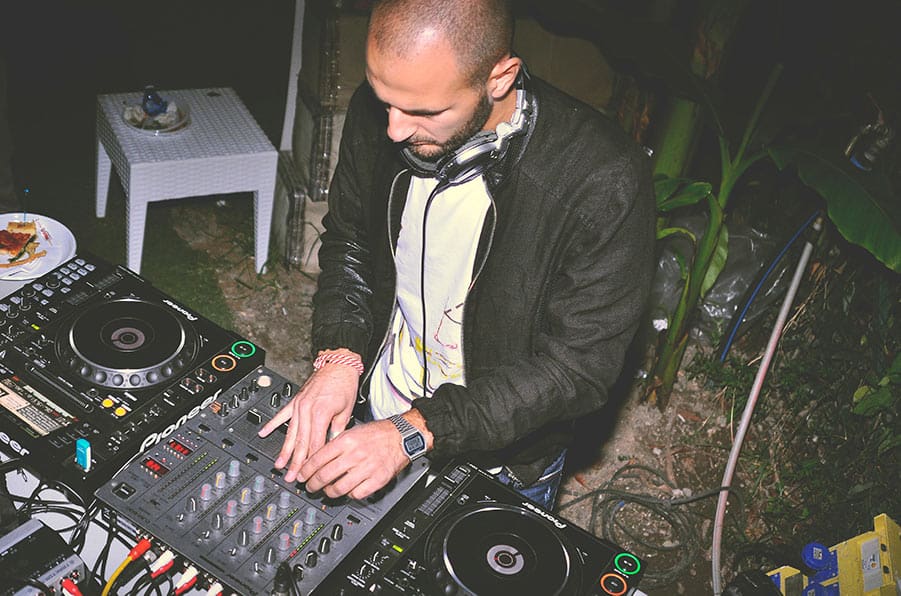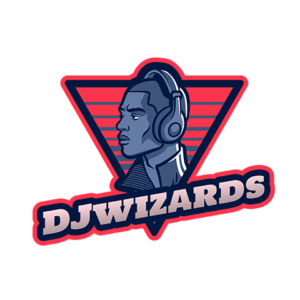
DJ stands for ‘disc jockey’ and in the early days of radio, it described the person who changed the gramophone records live on air so that one song would play after the other. While the term has now become far more widely used to describe a variety of complex activities performed by music producers, mixers, and live artists, it essentially still means the same thing: a DJ is a person who decides which song will play next and changes the music when required.
Standard DJ equipment consists of two turntables, a mixer, and headphones. The DJ will begin by playing a vinyl record on one turntable and then, using the headphones, cue up a second record on the other turntable. By listening to the second record with one ear through the headphones, the DJ should be able to adjust the speed until it matches that of the first record. Once the two records are playing in perfect time, they can be mixed together using the mixer.
The changing face of DJing
New technology and the development of electronic music in the early 90’s changed the way live music is consumed by concert attendees. DJ’s moved from playing behind closed doors on the radio to slowly become a staple addition to any live concert, music performance, wedding or other events.
Traditionally, the key skill to DJing is training your brain to be able to hear two beats at the same time and differentiate between the two. This way, you will know if the second beat is going faster or slower than the first one and can adjust them as needed. However, these days the majority of DJs use modern software on laptops or CDJs to automatically synchronize the beats, rendering the skill somewhat redundant.
Nowadays, DJs are often more common and more popular at music festivals than live bands, with many big-name DJs producing their own music and releasing albums. Over the years, the role of a DJ has evolved and the term now describes several different activities.
Radio DJ
A Radio DJ is the most traditional form of the art. When radio was invented and stations began playing music off records, DJ’s came on board to change the music. Many would also take on the role of announcer or entertainer, introducing the next song, speaking a bit about the artist or discussing the day’s news or weather.
Nowadays, radio DJs also work on the Internet, doing podcasts or producing live shows that stream via websites. Despite the popular song ‘Video Killed the Radio Star’, radio stations around the world are still as popular as ever, both online and via the airwaves. Some of the more popular Radio DJs also play live gigs or festivals around the world.
Famous Radio DJs over the years:
- Dewey Philips – the first ever DJ to play Elvis back in the ‘50s
- Dick Clark – Started the American Bandstand in the ’50s
- Alan Freed – U.S. DJ who coined the term rock n’ roll
- John Peel – Famous ’60s – 70s British BBC Radio DJ
- Tim Westwood – Famous ’90s British hip-hop DJ
- Ameen Sayani – Iconic Indian DJ in the ’50s
- Howard Stern – Popular ’90s American ‘shock jock’
- Frankie Knuckles – Chicago house DJ of Hot Mix 5 fame
- Mikey Dread – Famous Jamaican ’70s DJ
Turntablist
As technology developed in the ’60s, some record-playing DJs began experimenting with altering the speed on vinyl record players. They discovered they could lineup two different records to play at the same speed and manipulate the records to produce interesting effects. Using a mixer, these records could be played on top of each other, opening up a world of possibilities for beat-matching and musical artistry.
These days, turntablist DJing has developed into a highly complex skill that requires a huge amount of practice and incredible attention to detail. Also known as scratch DJs, turntablists compete at DJ battle competitions and perform their art against other DJs almost like a sport. With the development of CDs in the 90s and now MP3s and other digital formats, turntablist DJing has become something of a niche skill but still attracts a large underground following.
Famous turntablists:
- Kool Herc – one of the original inventors of the art
- Grandmaster Flash – creator of the quick-mix theory
- Grand Wizzard Theodore – accidental inventor of scratching
- Jam Master Jay – turntablist for famous hip-hop group Run-D.M.C.
- DJ Krush – famous ’90s turntablist
- DJ Shadow – hugely influential turntablist and producer
- Mix Master Mike – DJ for the Beastie Boys
Wedding/Live Event DJ
One of the easiest ways to get into DJ-ing and start earning money is playing at weddings or other events like parties and corporate functions. Many ‘up-and-coming’ club DJs will play weddings and events to make ends meet until they become famous. Also known as mobile DJs, these types of DJs will usually travel long distances by car to attend events in remote areas.
Wedding DJs are simply there to perform a function so it detracts from the artistic side of the skill. Often the music you can play will be dictated to you and you must simply provide the equipment and change the songs. However, if you are a bedroom DJ and already own the necessary equipment its a great way to make money on the side. Some people even make a career out of it!
Club DJ
The club DJ is what most beginner DJs aspire to become. They are the famous arms-in-the-air, reach-for-the-lasers, hotels-champagne-jetplanes DJs that TV music channels sell to us. However, unless you are in the top 1% of famous club DJs, you will most likely spend more time playing 5 am sets to a dancefloor of 10 people or less for minimum pay. Becoming a famous club DJ is incredibly difficult due to the huge amount of competition.
Many club DJs become famous simply through who they know but to be a really good club DJ you need to always have your finger on the pulse of the music industry. A good club DJ has contacts in the industry to get new tracks before they are released and knows exactly what his crowd wants to hear. The ability to read a crowd and select the appropriate music ‘on the fly’ is often considered the true skill of club DJing.
Famous Club DJs:
- Richie Hawtin – the godfather of minimal techno
- Carl Cox – iconic British techno and house DJ
- Goldie – influential ’90s jungle and drum & bass DJ
- Fatboy Slim – British icon popular for big beat music
- Tama Sumo – German techno DJ and Berghain resident
- Larry Levan – Famous New York DJ and Paradise Garage resident
- John Digweed – Voted World No. 1 DJ in 2001 by DJ Magazine
DJ / Producer
In the past, electronic music would be produced by artists in studios and then provided to DJs to play live at gigs. Over time, more and more producers have chosen to DJ their own music and vice versa. Nowadays, most big-name club DJs will also produce tracks of their own which they play in conjunction with the music of other artists.
Some producers DJ entire gigs where they play only their own music or play ‘live’ gigs where they produce the music on the spot using computers and synthesizers, similar to a live band using instruments.
Famous Producer DJs:
- Green Velvet – early techno producer from the ’80s
- Calvin Harris – Scottish dance music producer
- Tiesto – Dutch producer once named Greatest DJ of All Time
- Skrillex – American emo-turned-EDM music producer
- Deadmau5 – Canadian house and electro producer
- Alfredo Fiorito – Argentinian DJ famous for the Balearic Beat
- David Guetta – hugely successful French house and pop music producer

